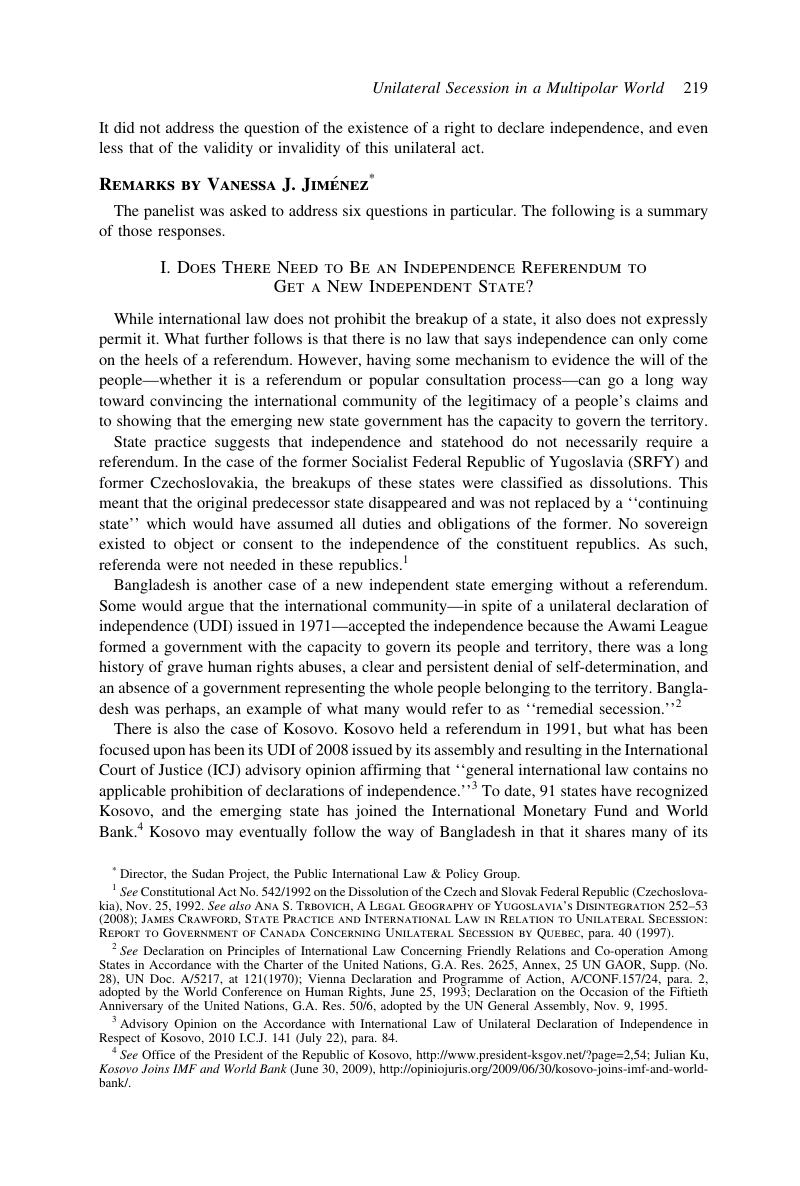No CrossRef data available.
Article contents
Remarks by Vanessa J. Jiménez
Published online by Cambridge University Press: 20 January 2017
Abstract

- Type
- Unilateral Secession in a Multipolar World
- Information
- Copyright
- Copyright © American Society of International Law 2014
References
1 See Constitutional Act No. 542/1992 on the Dissolution of the Czech and Slovak Federal Republic (Czechoslovakia), Nov. 25, 1992. See also Ana S. Trbovich, A legal Geography of Yugoslavia’s Disintegration 252—53 (2008); James Crawford, State Practice and International Law in Relation to Unilateral Secession: Report to Government of Canada Concerning Unilateral Secession by Quebec, para. 40 (1997).
2 See Declaration on Principles of International Law Concerning Friendly Relations and Co-operation Among States in Accordance with the Charter of the United Nations, G.A. Res. 2625, Annex, 25 UN GAOR, Supp. (No. 28), UN Doc. A/5217, at 121(1970); Vienna Declaration and Programme of Action, A/CONF. 157/24, para. 2, adopted by the World Conference on Human Rights, June 25, 1993; Declaration on the Occasion of the Fiftieth Anniversary of the United Nations, G.A. Res. 50/6, adopted by the UN General Assembly, Nov. 9, 1995.
3 Advisory Opinion on the Accordance with International Law of Unilateral Declaration of Independence in Respect of Kosovo, 2010 I.C.J. 141 (July 22), para. 84.
4 See Office of the President of the Republic of Kosovo, http://www.president-ksgov.net/?page=2,54; Julian Ku, Kosovo Joins IMF and World Bank (June 30, 2009), http://opiniojuris.org/2009/06/30/kosovo-joins-imf-and-world-bank/.
5 Reference re Secession of Quebec, [1998] 2 S.C.R. 217, paras. 112, 122, 129, 130, 134 & 138 (helping to elaborate further on the matter of remedial secession, but still only of domestic applicability).
6 This is not to discount the many international courts and human rights committees and commissions that have opined on the right to self-determination more generally, especially in the context of the disposition of natural resources and a people’s rights not to be deprived of means of subsistence.
7 Sudan Referendum Act arts. 2, 14, 30, 31, 41 & 60 (2009).
8 Of course, if a free and fair independence referendum were to be properly carried out pursuant to a domestic constitutional provision for such a referendum, international law would also tend to imbue the results with legal effect.
9 Constitutional Charter of the State Union of Serbia and Montenegro art. 60 (2002).
10 Bougainville Peace Agreement para. 2 (government of Papua New Guinea, leaders representing the people of Bougainville, 2001).
11 Black African nationalists boycotted the 1964 referendum and were discouraged from participating in the referendum. The whites-only electorate resoundingly supported independence. See Jacob Chikuhwa, A Crisis of Governance: Zimbabwe 19 (2004).
12 See remarks of Patrick Dumberry, supra at 213.
13 Gillot v. France, Human Rights Committee, Comm. No. 932/2000, UN Doc. A/57/40 at 270, paras. 13.16, 14.4, 14.7 & 15 (2002).
14 See, e.g., Eritrea 1993 referendum (persons not of Eritrean origin had to demonstrate residence in Eritrea for extended periods of time and meet a number of other linguistic and cultural criteria whereas those born in Eritrea or to Eritrean parents had no residency requirements); Gibraltar 2002 referendum (British nationals had to satisfy a ten-year residency requirement whereas those born in Gibraltar or from families with roots in Gibraltar were not subjected to any residency criteria); Tokelau’s 2006 and 2007 referenda (native Tokelauans were only required to demonstrate three months of residence whereas non-Tokelauans had to show five years of residency); Southern Sudan 2011 referendum (individuals without the requisite ethnic ties to territory had to demonstrate either their own or their parents’ or grandparents’ “permanent residence, without interruption” in Southern Sudan from 1956 until 2011 whereas those satisfying the ethnic criteria had no residency requirement).
15 New Caledonia 1998 and 2014 and onwards referenda (10 years & 20 years respectively); Montenegro 2006 referendum (two years); Gibraltar 2002 referendum (10 years); Quebec 1995 referendum (six months).
16 See, e.g., Sudanese Nationality Act 1957 art. 3 (last amended 1974); Organic Law of New Caledonia (No. 99-209) of March 19, 1999, reflecting Noumea Accord (1998); Liberia Aliens and Nationality Law, pt. 1, ch. 1 (1973, amend. 1974); Austrian Nationality Act (1985, as amended 1998); Law on Croatian Citizenship (1991). See also Quebec 1995 (“the domicile of a person for the exercise of his civil rights is at the place of his principle establishment…. The residence of a person is the place where he ordinarily resides; if a person has more than one residence, his principle residence is considered in establishing domicile”). There are narrow exceptions in which a temporary absence from someone’s permanent residence is deemed acceptable and not disruptive to his or her satisfaction of continuous residency. This includes military service, government service, vacation, medical reasons, and education.
17 Montenegro’s 2006 referendum required a 50% turnout of eligible voters. Macedonia’s 2004 referendum to repeal decentralization laws of the autonomous areas required more than 50% of registered voters to turn out. Bosnia-Herzegovina’s 1992 independence referendum required the majority of eligible voters to turn out. Southern Sudan’s 2011 referendum required 60% of registered voters to cast their votes.
18 Soviet 1991 All Union referenda (67% approval quorum); 2006 and 2007 Tokelau referenda (two-thirds approval quorum); Montenegro 2006 referendum (55% approval quorum); Western Sahara intended referendum (no approval quorum); Quebec 1995 & Boznia-Herzegovina 1992 (simple majority); Southern Sudan 2011 referendum (simple majority (50% +1) of the total number of votes cast).
19 See International Covenant on Civil and Political Rights, G.A. Res. 2200A (XXI), 21 UN GAOR Supp. (No. 16), at 52, UN Doc. A/6316 (1966), 999 U.N.T.S. 171 art. 1; International Covenant on Economic, Social and Cultural Rights, G.A. Res. 2200A (XXI), 21 UN GAOR Supp. (No. 16), at 49, UN Doc. A/6316 (1966), 993 U.N.T.S. 3 art. 1.
20 Katherine Schulz Richard, The League of Nations: From 1920 to 1946 the League of Nations Attempted to Maintain Global Peace, About.com, http://geography.about.com/od/politicalgeography/a/The-League-Of-Na-tions.htm.
21 Growth in United Nations Membership, 1945—present, http://www.un.org/en/members/growth.shtml.




